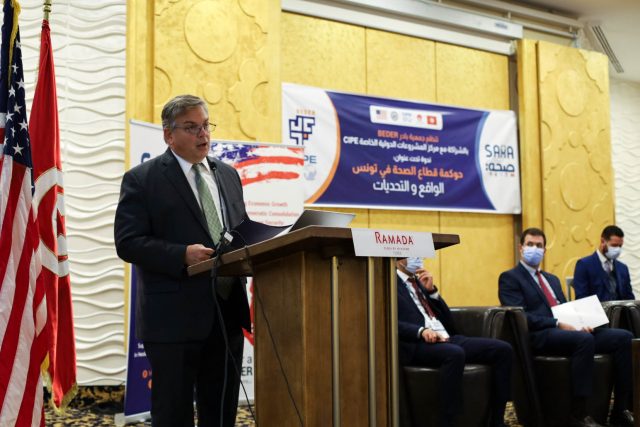
Director-General of Health, Abderrazek Bouzouita, and the U.S. Ambassador to Tunisia, Donald Blome, participated in a roundtable discussion with Tunisian experts and officials on health governance in Tunisia on October 21. The roundtable is part of a $5 million U.S. Embassy funded “SAHA” project, in partnership with BEDER and the Center for International Private Enterprise (CIPE) to improve transparency and efficiency in health and pharmaceutical sector.
The event was an opportunity for key stakeholders to discuss challenges and potential solutions to healthcare governance in Tunisia. Participants addressed a variety of important topics such as management of healthcare facilities, governance in the pharmaceutical sector, and patient-centered approach to health governance.
This roundtable marked the beginning of a series of events and activities, under the SAHA project, to help improve the governance legal, and regulatory framework of the healthcare sector for Tunisia and its citizens.
During his opening remarks at the event, the Tunisian Director-General of Health Abderrazek Bouzouita stated “Project “SAHA” is one of the pillars of governance in the health sector in Tunisia to raise challenges to achieve transparency and a better capacity to perform the health system.”
Ambassador Blome reiterated: “The SAHA project is an example of our shared interest in increasing transparency to more effectively respond to the needs of the Tunisian people.”
The Project Director Mr. Issam Sghaier presented the project’s major anticipated outcomes, which include the development of an electronic track-and-trace system for medicine, a participatory dialogue to prioritize and advocate for reforms to health laws and regulations, and an overhaul of Tunisia’s medical continuing education and professional development curriculum and certification system.
About the SAHA Project
The SAHA project is funded through a $5-million grant by the US Embassy in Tunisia and will be implemented over a period of three years. Under this project, CIPE, in partnership with the Tunisian Ministry of Health, seeks to achieve the following goals:
- Developing an electronic tracking system for the medicinal supply chain in Tunisia.
- Overseeing a consultative process aiming to strengthening good governance and transparency through the reform of laws and regulations relevant to the health sector.
- Updating the training curricula of the Ministry of Health through the development of content that supports good governance and transparency, the launch of an electronic platform for remote learning and professional exchange, and the modernization of the training certification system.
About CIPE
CIPE is one of the core institutes of the National Endowment for Democracy and an affiliate of the U.S. Chamber of Commerce. Founded in 1983 and based in Washington, D.C., CIPE is a not-for-profit organization dedicated to helping build environments conducive to economic growth and entrepreneurship by strengthening governance, integrity, and transparency. CIPE works with business leaders, policymakers, and civil society to build the institutions vital to a democratic society. CIPE’s key program areas include enterprise ecosystems, democratic governance, business advocacy, anti-corruption & ethics, and trade.
About BEDER
BEDER is a non-profit organization that was founded by a group of civil society activists after the revolution in January 2011. Its main interest is to increase and diversify the possibilities of community development in Tunisia. BEDER works on this mission by increasing and accelerating the impact of local actors and stakeholders as well as by cultivating the leadership needed for this change and the community resilience that will sustain it.
About the U.S. Embassy’s Assistance Unit
The U.S. Embassy’s Assistance Unit (AU) supports programming developed in coordination with the Government of Tunisia and the Tunisian people to accelerate economic development and strengthen democratic institutions. The AU coordinates with other U.S. government agencies as well as the international community to develop programs that seek to strengthen Tunisia’s economy and democratic development. The AU manages projects financed through various funding mechanisms, including bilateral Economic Support Funds, Middle East Partnership Initiative (MEPI) local grants, and three regional MEPI leadership programs.
For more information, please contact Ms. Mariem Manaa: mmanaa@cipe.org
Published Date: October 25, 2021
